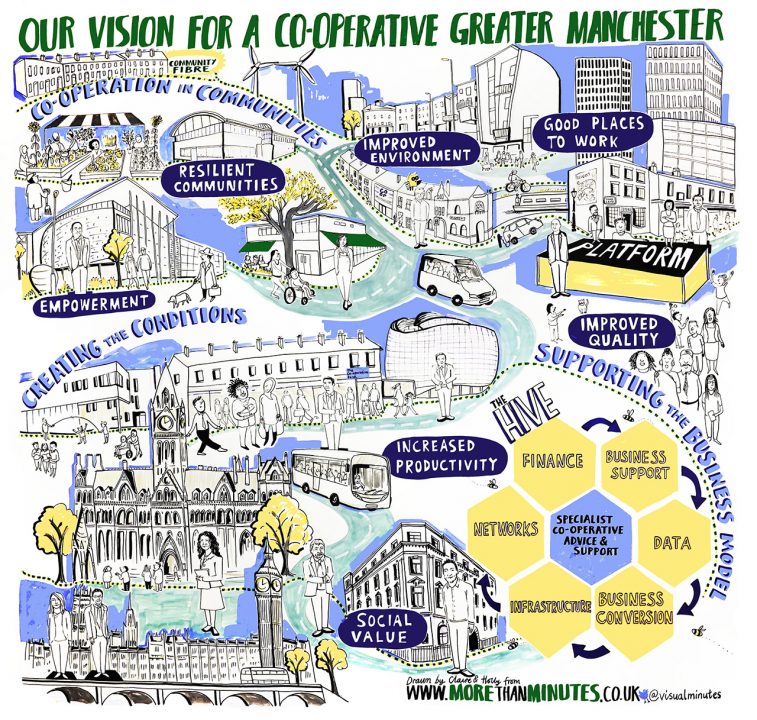A new report is calling for further support for co-operatives in Greater Manchester to ensure the city region stays at the forefront of co-operative development and bring even greater economic benefits to the local community.
Measures suggested in the report, A Co-operative Greater Manchester, include calls to support workers in precarious employment, and bodies to drive community led housing and transport solutions.
The report is the work of the Co-operative Commission, announced in the summer of 2018, by Andy Burnham, mayor of Greater Manchester, and tasked with developing a policy for co-ops in the city region.
James Wright, policy officer at apex body Co-operatives UK, called it a “golden opportunity to make devolution work for co-ops in one of the UK’s most high-profile cities”. The commission called on co-ops across the country to respond, to inform a series of learnings that could be shared and replicated across the country.
The independent commission was formally established in February 2019 and was tasked with making evidence-based policy proposals for how Greater Manchester Combined Authority (GMCA) could support co-op development in three specific sectors: housing, the digital economy and transport. These were chosen because of their fit with the Greater Manchester Strategy and were accompanied by the a fourth cross-cutting focus, on what GMCA could do to enhance support for co-operative business development in Greater Manchester.
There were nine commissioners chosen to oversee the work, who met throughout 2019: David Batten (chief executive, Hoot Credit Union); Mike Blackburn OBE (chair, Greater Manchester Local Enterprise Partnership); Kellie Bubble (director, Unicorn Grocery); Shaun Fensom (Tameside Digital Infrastructure Cooperative); Paul Gerrard (campaigns and public affairs director, Co-operative Group); Cliff Mills (consultant, Anthony Collins Solicitor); Simon Parkinson (then chief executive and principal, Co-operative College); Jo Platt (Labour & Co-operative Party MP for Leigh, until Dec 2019) and James Wright. The Commission was chaired by Cllr Allen Brett, with Cllr Angeliki Stogia as vice-chair.
Over 160,000 people in Greater Manchester are already members of a co-operative, and collectively these co-operatives contribute £73 million to the local economy. “As the home of the co-operative movement, it’s vital we harness those values and put them at the centre of everything we do, working with co-operatives and social enterprises to build a stronger, fairer Greater Manchester where nobody is left behind,” said Mr Burnham.

“Through the work of the Commission, we have an opportunity to do things differently and explore new and innovative ways to nurture, grow and work more closely with the co-operative sector so it plays a central role in making Greater Manchester one of the best places in the world to grow up, get on and grow old.”
Now, as the movement marks the 175th anniversary of the Rochdale Pioneers setting up shop, the Commission’s report has been published, and was officially launched on Monday 27 January.
The report has set out a number of recommendations to support the development of the co-operative sector in Greater Manchester and make the most of the social, environmental and economic benefits co-operatives bring.
The Commission has recommended Greater Manchester is designated as a Co-operative Zone with a dedicated resource to offer business advice and support for both existing co-operatives and those who wish to start or convert to a co-operative approach.
Other recommendations include:
- Partners from across all sectors in Greater Manchester should come together to enable an increase in community-led, place-based approaches to co-operation, community ownership and economic development
- Greater Manchester should lead on developing a city-region version of pioneering work in Europe, drawing together ‘freelancers’ and people in precarious employment into a powerful and functional economic unit
- Greater Manchester should set up a Greater Manchester Community Housing Hub to address a gap in the housing market and enable the establishment of co-operative and community-led housing projects
- Greater Manchester should carry out a place-based pilot programme for the development of community-owned ‘total transport’ business models / community transport to link up with shared modes and mainstream network as part of the ongoing work around bus reform.
Mr Burnham said: “The building blocks of co-operation in Greater Manchester are already strong and more than 160,000 people in the city region are already members of a co-operative, with co-operatives contributing £73m to the city-region’s economy.
“The commission has been crucial in drawing on the work that needs to be done to continue and further the success of co-operatives in Greater Manchester. I would like to thank them for all of their efforts in preparing this important report, and hope these recommendations can steer the
co-operative community to bring even more benefits to our economy.”
Chair of the Greater Manchester Co-operative Commission and leader of Rochdale Council, Cllr Allen Brett, said: “Our vision for Greater Manchester is one where people collaborate, communities are empowered and co-operatives grow and thrive.
“The pioneers set up their first co-operative shop in Rochdale and we believe that Greater Manchester should continue to lead the way in co-operative innovation, applying the principles and values to create an economy based in maximising impact and productivity for all.
“That is what this report is all about, using this innovation and harnessing the power of co-operatives for the good of everyone in Greater Manchester. I hope that the co-operative community will use it to help build on all of the success they have already had as we look to build co-operation for a new decade.”